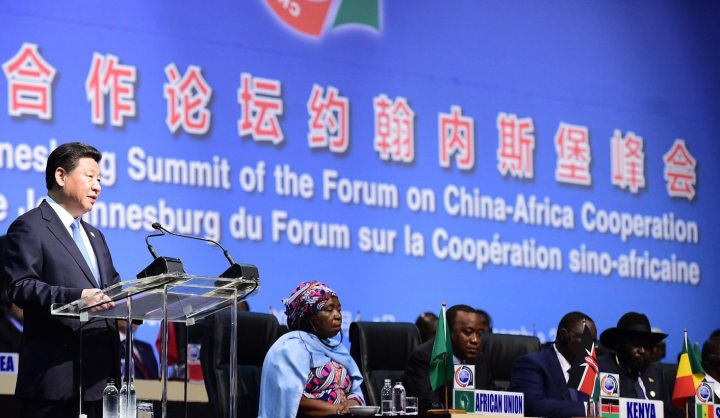There were no surprises at the China-Africa summit in Johannesburg this week, except for the size of the Chinese pledge: $60 billion dollars is a lot of money, in anyone’s currency, and African leaders were falling over themselves to ingratiate themselves with their benefactors. But talk of an equal partnership remains an illusion. By SIMON ALLISON.
If we learnt one thing from the latest Forum on China-Africa Cooperation, held in Johannesburg this weekend, it is that talk of an equal partnership remains a comforting platitude, something that exists only in the pro-forma speeches uttered by leaders on both sides of the divide. The truth, that there was one superpower in the Sandton Convention Centre, surrounded by 54 supplicating vassal states, makes for a less politically acceptable soundbite.
The most compelling illustration of this was the trade exhibition in the basement, showcasing the respective might of Chinese and African industrial capacity. The Chinese displays took up most of the floor, and included: a 50-metre-long replica of a bullet train; scale models of various aircraft; Hisense’s latest TVs, tablets and smartphones. Compare and contrast with the tiny Angolan stand, showcasing its finest manufactured exports: small cartons of sweetened fruit juice, and a few packets of biscuits. Never mind a level playing field; when it comes to trade, China and Africa are not even playing the same game.
Consider, too, the steady stream of African leaders making their way to the makeshift CCTV studio for an interview, brushing past the rest of the waiting media pack, most from African outlets, like they did not exist. Many of these presidents and prime ministers rarely, if ever, talk to journalists one-on-one in their own countries, but almost all managed to make time for soft-ball questions from the Chinese state broadcaster. Much to the frustration of the South Africa’s state broadcaster, Chinese President Xi Jinping did not return the favour.
Such behaviour is explained, and perhaps excused, by the sheer size of the carrot that Xi has dangled in front of African leaders. Who would not show a little deference in exchange for a share of the $60 billion dollar pie that Xi announced in his speech to open proceedings on Friday? Who wouldn’t kowtow to a nation that is about to forgive the debt of low-income African countries? On the plus side, that $60 billion figure – which has grabbed most of the headlines – is a genuine statement of intent, underlining Africa’s importance to China’s long-term strategic thinking. There is power in this for African leaders wise enough to recognise it. The greater China’s need for Africa, the more Africa is in a position to influence the terms of engagement; to make them, eventually, a little more equal.
On the minus side, neither the $60 billion nor the debt forgiveness deal are quite as impressive as they sound at first. Most of the money is designated for loans rather than aid, creating or reinforcing a financial dependency between China and individual African countries, while the debt forgiveness refers only to a special (and relatively small) category of zero-interest foreign loans, as academic Deborah Brautigam explains.
There is not actually a lot of detail supporting these pledges, which is not a surprise. Previous China-Africa forums have produced similar outcomes, as have recent African engagements with other superpowers. Take the India-Africa summit in New Delhi last month, where Indian Prime Minister Narendra Modi promised $10 billion in credit to build a “partnership of prosperity” with Africa. Or the US-Africa summit in Washington DC in 2014, where Barack Obama unveiled a package of investment deals, loan options and security cooperation agreements worth $37 billion. All were vague on specifics, but high on headline-grabbing round numbers.
The Indian and American summits are important to remember because they contradict the pervasive narrative that there is something different, something exceptional about China’s engagement with Africa. Actually, China is doing what everyone else is trying to, just with more attractive terms. The key point of difference was reiterated by President Xi on Friday.
“We should respect each other’s choice of development path and not impose one’s own will on the other. On issues involving core interests and major concerns of each side, we should show mutual understanding, support each other and jointly uphold equity and justice. China strongly believes that Africa belongs to the African people and that African affairs should be decided by the African people,” he said.
In other words: China will not interfere with the internal politics of the state. There will be no demands for democracy, accountability or human rights. No strings attached. This is China’s competitive advantage, at least from the perspective of African leaders who are tired of people telling them what to do. This sentiment is understandable; sometimes, it stems from a selfish interest to protect a leader’s own power; sometimes, it stems from the fact that foreign interference, even if well-meaning, has had disastrous consequences for African development in the past.
In the context of the much-examined (and much-maligned) China-Africa relationship, this summit broke little new ground. We all know how the relationship works now, and all President Xi told us was that we can expect more of the same – an outcome welcomed, without exception, by the African leaders present. Like it or not, the China-Africa honeymoon continues. DM
Photo: A handout picture provided by the South African Government Communication and Information System (GCIS) shows Chinese President Xi Jinping addressing delegates at the opening of the Forum on China-Africa Co-operation (Focac) Summit being held in Sandton, Johannesburg, South Africa, 04 December 2015. EPA/ELMOND JIYANE/GCIS/HANDOUT.



















 Become an Insider
Become an Insider